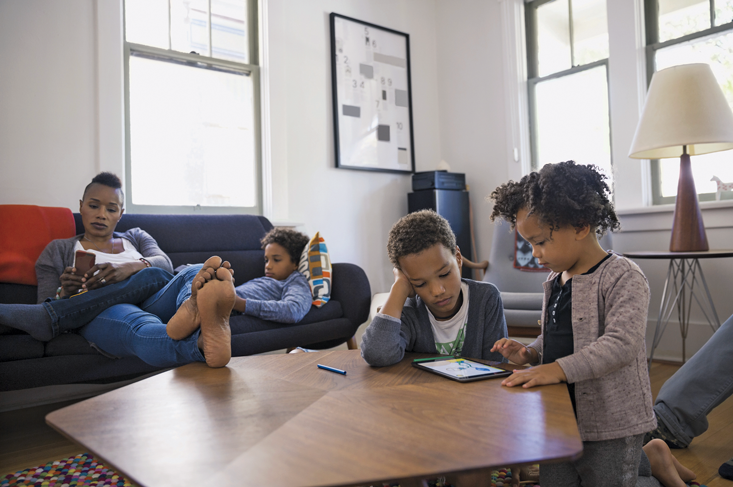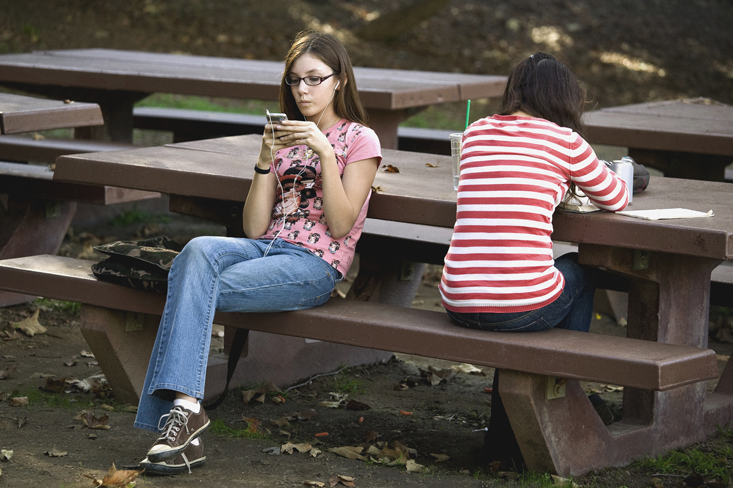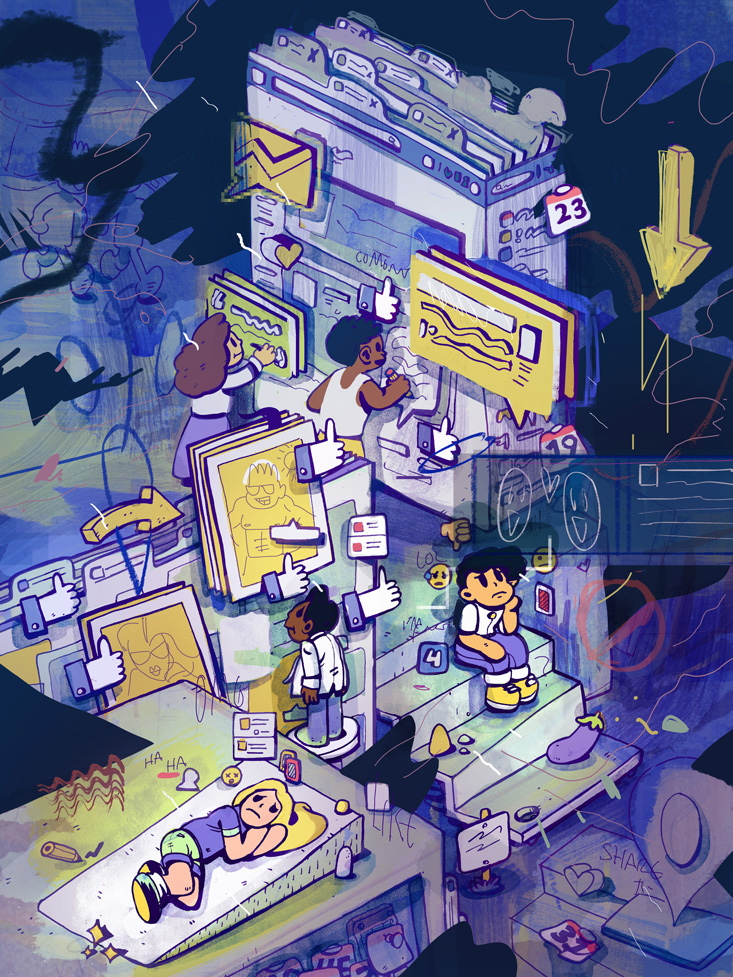In his free time, Sven Laumer serves as a referee for Bavaria’s highest amateur football league. A few years ago, he noticed several footballers had quit Facebook, making it hard to organize events on the platform. He was annoyed, but as a professor who studies information systems, he was also intrigued. Why would the young men want to give up Facebook? Social scientists had been saying the social network was a good thing.
“At the time, the main paradigm in social networking research was that Facebook is a positive place, it’s a place of happiness, it’s a place where you have fun, you get entertained, you talk to friends, you feel amused, accepted,” says Hanna Krasnova, an information systems researcher at the University of Bern in Switzerland. Influential studies had shown that the social capital we earn on social media can be key to our successes, big and small. Our virtual connections were known to help us access jobs, information, emotional support, and everyday favors. “Everyone was enthusiastic about social media,” Laumer says.
Laumer, an assistant professor at Otto-Friedrich University in Germany, suspected that quitting Facebook was a classic response to stress. He knew other researchers had looked at something called “technostress,” which crops up in workplaces due to buggy interfaces or complex processes. But that didn’t really fit with Facebook, which is easy to use. Something else seemed to be stressing people out. “We thought there was a new phenomenon on social media in particular,” Laumer says.
Facebook’s News Feed didn’t feel entertaining; it loomed like a long list of demands. Cheer me up. Comfort me. Wish me a happy birthday. Fund my Kickstarter.
Through probing interviews, surveys, longitudinal studies, and laboratory experiments, researchers have begun to shift the paradigm, revealing that Facebook, Twitter, Instagram, Snapchat, and their ilk are places not only of fun and success, but of dark, confronting, and primal human emotions—less Magic Kingdom and more creepy fun house. In many ways, researchers say, these platforms are giant experiments on one of our species’ most essential characteristics: our social nature. So it shouldn’t be a surprise there are unintended consequences.
“No one constructed something to make people feel bad or good,” says Ethan Kross, a social psychologist at the University of Michigan. “But, what we’re looking at is, how does it actually play out and impact people in daily life?”
One consequence may be that using Facebook can lead you to feel a little bit sadder—a phenomenon popularly known as “Facebook depression.” In their 2013 study of Facebook, Kross and his colleagues text messaged 82 people—mostly undergraduates recruited in Ann Arbor, Michigan—five times a day to ask how much they had used Facebook and how they felt. “What we found was that, the more people reported using Facebook during one moment in time, the more their self-reported mood declined from the beginning of that period to the end,” Kross says.

Why? Laumer and his colleagues noticed that, for some of the participants, Facebook’s News Feed didn’t feel entertaining; it loomed like a long list of demands. Cheer me up. Comfort me. Wish me a happy birthday. Fund my Kickstarter. Like this new profile picture. Read my new feature in Nautilus. Social networking sites blast users with requests in ways never before possible. Requests don’t go out one-to-one; they go out like buckshot, one-to-many. No wonder people get stressed by them. Stress is what arises when people feel that they don’t have the resources or ability to cope with some perceived threat—in this case, the threat of what Laumer calls “social overload.”
Ironically, social overload is the flip side of what other researchers have found to be one of the most positive aspects of social media: social sharing. Sharing one’s problems with others online can reduce stress associated with everything from everyday pressures to life transitions to natural disasters, says medical sociologist Shelia Cotten of Michigan State University, who, in one study, found that Internet use can decrease loneliness in older Americans. “There’s a whole lot of social support that gets exchanged that can have very beneficial aspects to your health and well-being and can help to alleviate stress.” The problem is, as you’re alleviating your stress, you’re putting it onto others.
Sociologist Keith Hampton of Rutgers University, who has conducted social media surveys for the Pew Research Center, calls this second-hand stress “the cost of caring.” It should be no surprise, he says, that women tend to pay this price more than men, since they carry much of the burden of care for family and friends both online and off. “When you’re aware of bad things happening to people you know, not only does it bring stress to your life, but it also allows you to provide them with social support and empathy,” he says.
But not all friends are created equal online. On social media, we can keep adding contacts ad infinitum—including people we rarely or never see in real life. “For the first time in modern history, ties are persistent in a way they haven’t been before,” Hampton says. Laumer and his colleagues found social overload is more likely to strike people who have more Facebook-only friends.
That makes sense. In the 1990s, anthropologist Robin Dunbar proposed that human beings have the time and bandwidth to sustain 100 to 200 friendships at a time. In a recent study involving 1.7 million users, Dunbar and his colleagues found that Twitter users maintained “stable social relations” with about that same number on average. But if we have about 150 friends we regularly contact and think about on Facebook or Twitter, and they all regularly put out social support requests, then we’re already juggling more demands than our ancestors ever would have. Where do we fit in our real friends? Many overwhelmed users consider just quitting wholesale. “Social overload has a strong effect on exhaustion,” Laumer says.
Facebook, Instagram, and their ilk are places not only of fun and success, but of dark, confronting, and primal human emotions—less Magic Kingdom and more creepy fun house.
On top of that, studies have confirmed what’s plain to every user: Friends tend to post the things that make them look good. In one Portlandia skit, Fred Armisen’s character takes his new flame on a weekend trip to Italy. They sleep through the whole thing in a hotel and end up miserable. Earlier they had posted a bunch of photos of themselves smiling and looking happy. When he gets home and watches his friend (Carrie Brownstein) scroll through the photos, congratulating him on his trip, he tells her, “Everyone on the Internet, they’re not having as great a time as you think they are.” She replies, “I guess people are just cropping out all the sadness.”
Truth be told, even if people aren’t cropping out the sadness, and instead posting dull or disparaging things about their daily lives, we’re unlikely to pay attention. Humans automatically linger on people of high status—especially people who look attractive or rich (cue the Kardashians). Charlotte Blease, a cognitive scientist who studies depression, sees social status at the root of our social media malaise. In a 2015 paper called “Too Many ‘Friends,’ Too Few ‘Likes’? Evolutionary Psychology and ‘Facebook Depression,’ ” Blease, a researcher at the University of Leeds and Harvard Medical School, turns to our ancestral environments for an explanation.
One evolutionary explanation for depression, Blease tells us, is known as the “social competition theory.” It holds that depression is an adaptive suite of behaviors—withdrawal, slumped posture, low self-esteem—that enabled our ancestors to retreat from antagonistic social encounters and “signal inaction to dominant others without incurring physical damage.” In other words, get depressed, stay alive. “It acts as a sort of deescalating strategy, an involuntary response where you’re almost just putting your hands in the air,” Blease says.
This adaptive behavior—assuming deference and low social status—has stayed with us. In modern environments it can be triggered when we sense we’re being outcompeted by those of high social status or prestige. “We’re drawn to those kind of individuals, which then may perpetuate the feeling of, ‘I’m a loser compared to these people,’ ” Blease says.
Of course, social comparison could also turn us an ugly shade of green. Evolutionarily speaking, envy, like mild depression, is probably adaptive—it motivates us to learn from others and set higher goals. But envy is also painful, which makes it hard to study, says Krasnova. “It is a very tricky feeling, so we don’t want to admit envy, usually—not to anybody that we feel envious of, and not even to ourselves,” she says. “Sometimes the feeling could get so suppressed we don’t know what we’re feeling and why we’re feeling so angry or so sad, or so irritated or stressed.”

When Krasnova and her colleagues asked 357 subjects—mostly from Germany, where she was working—how they felt after using Facebook most recently, only 1.2 percent of them said envious. So she rephrased the question: “Many users report feeling frustrated and exhausted after using Facebook. What do you think causes these feelings?” In this case, the most popular response (29.6 percent) was envy. Not only is envy a common feeling for people using Facebook; it’s “rampant,” she says.
Examples are omnipresent. Parties we wished we were invited to. Awards our colleagues have won. In Paula Hawkins’ psychological thriller The Girl on the Train, protagonist Rachel Watson is still smarting from her recent divorce when she goes on Facebook and sees her ex-husband’s baby announcement. She’s devastated.
Krasnova notes that one way people find temporary relief for the pain of envy is by bolstering their own self-presentation. That threatens to generate an “envy spiral” on social networks, she warns. “Users are exposed to positive content, they post even more positive things, then their recipients post even more positive things. And so on. And then this world of Facebook becomes more and more detached from reality.”
Perhaps the most intriguing finding in the recent literature, however, is that people do themselves the most harm when they’re not posting.
Instead of bringing us closer to our friends, this detached world can insert distance. In her book, Reclaiming Conversation, psychologist Sherry Turkle of the Massachusetts Institute of Technology talks about the tension between “our desire to express an authentic self and the pressure to show our best selves online.” But studies show we don’t actually present our best, most sympathetic selves when we write, although we think we do. Behavioral scientist Nicholas Epley of the University of Chicago had business-school students do an “elevator pitch” in several formats. While the students felt that they presented themselves better in a written pitch, the evaluators judged them more favorably in a spoken pitch.
This also applies to Facebook: A recent study that echoes Epley’s results showed that our friends think we are better in person than in our profiles. “At the most extreme level, our data suggest that text is somewhat dehumanizing—that is, it doesn’t convey the same kind of uniquely human qualities, qualities of thinking and feeling, that your voice does,” Epley says.
The Facebook of the envy spiral can even turn us against each other. “Our research clearly shows that in many cases [self-promotional] information is seen negatively and interpreted very judgmentally,” Krasnova says. Some researchers warn we are growing more narcissistic—and correspondingly less empathetic—as a result of the time we spend managing our image online. “There’s little data that suggests that narcissism is a great thing,” Epley says. “It’s pretty good in the short run; not so good for you in the long run in terms of your relationships.”
Perhaps the most intriguing finding in the recent literature, however, is that people do themselves the most harm when they’re not posting. For a study published this year, Kross and his colleagues, including first author Philippe Verduyn, a psychologist from Maastricht University in the Netherlands, invited 84 University of Michigan undergraduates to a lab, where they instructed half of the subjects to use Facebook actively and half to use it passively. Active use is “posting status updates, chatting, responding to a comment,” Verduyn explains, while passive use is “scrolling through news feeds, looking at pictures, and looking at status updates.” A few hours after the session, the active users felt the same, yet the passive users felt a drop in mood. “When you’re just passively using Facebook, you develop more feelings of envy, which in turn lead people to feel worse over time,” Kross says.
On the one hand, the finding is a good thing. It means that there’s a way to escape the Facebook blues without losing access to social media’s positive benefits: Be more active. On the other hand, very few of us take advantage of that loophole.
Verduyn and his colleagues found that subjects were about 50 percent more likely to use Facebook passively than actively. And that’s not limited to millennials. Market research firm GlobalWebIndex reports that only 52 percent of Facebook users were active users in 2014, down from 70 percent in 2012. It’s not clear why people are so passive. Maybe it’s just a lot less work to browse than post, but other lines of research on Facebook’s dark sides indicate that people worry about unintentionally insulting someone, putting their relationships or jobs at risk, or just looking like a loser wasting time online. The specter of public shaming looms over every post. Whatever the reason, Kross says, “most of the time that people are using [social media], they’re using it in a way that is potentially harmful”—that is, passively.
Fortunately, social-networking research is one scientific field where findings can be translated into practice at light speed. Studies in the pipeline will likely reveal both beneficial and harmful behaviors that go beyond the passive and active dichotomy, as well as elucidate outcomes for different groups of users—people from different cultures, different age groups, and with different psychological predispositions. Scientists still lack a comprehensive picture of how social media technologies work on human nature, but “the hope is, by identifying the mechanisms that push people to feel worse, we can begin to come up with a formula for an optimal way to interact with the technology,” Kross says.
Some of Facebook’s features can already help put the research to use. In 2011 the site introduced “friend lists,” which we can use to restrict our social support requests to the people who are most likely to care, sparing the rest of our contacts from social overload. In 2013, we got “unfollow,” which can help us reduce overload and envy for ourselves. The 2014 “nearby friends” and this year’s “video calling” features could increase the frequency of face-to-face interactions, which in Kross’s studies consistently lift mood. Soon, the anticipated “reactions” buttons—alternatives to the “like” button, including “love,” “yay,” and “sad”—may provide more options for active behaviors.
The most important feature we can implement, however, may be one intrinsic to the user not the technology: empathy. An extraordinary achievement of human civilization is that, every day, people suppress the instinct to outcompete others in order to build meaningful and rewarding relationships. Yet online, with those seemingly harmless #nofilter travel pics, flawless #iwokeupthisway selfies, and relentlessly positive #humblebrags, we inadvertently make our friends feel like losers and contribute to a swirling vortex of envy, in which we ourselves risk drowning. The growing body of research on social media’s dark sides, Krasnova says, gives us the chance to build a new social media etiquette, one that will reattach the world of Facebook to reality and pay off in true friendships, full of both the costs and the benefits of caring. We should grab that opportunity—not because it will make our stress go away, but because some stress is the kind worth having.

Chelsea Wald is a science writer in Vienna, Austria. She recently wrote for Nautilus about why almost every language has a word for red and why our brains hate slowpokes.






























